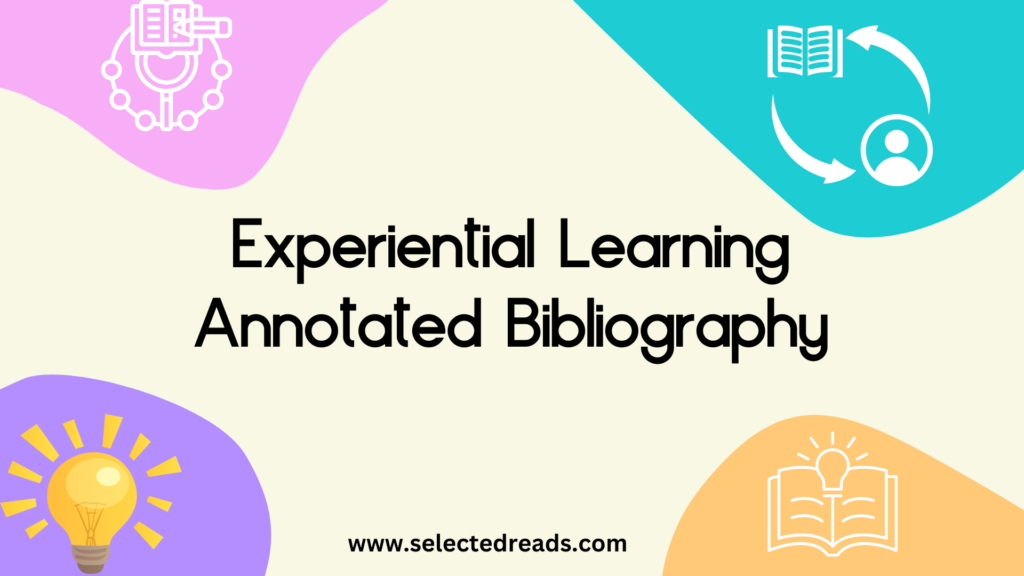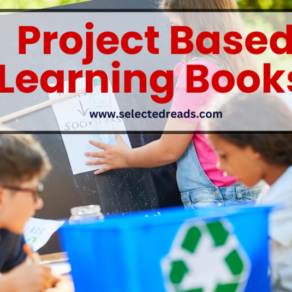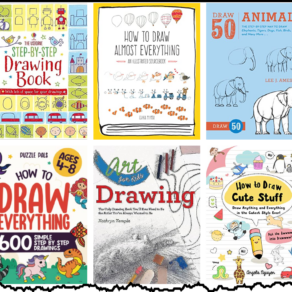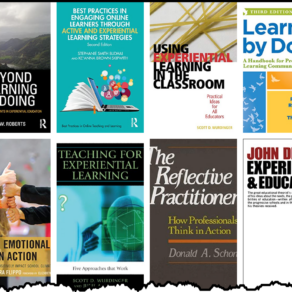Experiential learning annotated bibliography is the topic of our blog post today!
Experiential learning is an educational philosophy that I, like several of you fellow educators, find both compelling and integral to the modern classroom. It emphasizes learning through doing, engaging students actively in their education, and promoting deeper understanding.
For those of you interested in delving further into this concept, I’ve compiled an annotated bibliography to provide a thorough exploration of experiential learning from various angles. These authoritative sources and readings offer insights into practical applications, theoretical underpinnings, and innovative methodologies.

Whether you are a teacher, researcher, or simply passionate about education, these works will provide valuable perspectives on this transformative approach to teaching and learning.
If you’re new to the concept of experiential learning or want a more accessible explanation, I invite you to read my post entitled “Experiential Learning Simply Explained.” In it, I provide an overview that breaks down this complex idea into easily digestible parts. For more resources, check out experiential learning books.
Now, without further ado, let’s explore this collection of research papers and books that I’ve carefully selected, each contributing uniquely to our understanding and application of experiential learning.
I. Research papers on experiential learning
The studies below collectively contribute to a growing body of knowledge around experiential learning, reflecting the diversity and complexity of the field. They cover various topics and insights regarding student satisfaction, pedagogical practices, theoretical foundations, and the dynamics of global classrooms.
Findings from these studies, I believe, further support the necessity of a personalized, thoughtful, and flexible approach to teaching. They underscore the importance of considering prior learning experiences, peer interactions, and context-specific strategies in enhancing student engagement and satisfaction.
These research articles not only fuel academic understanding but also provide practical implications for those of us striving to create more effective and engaging learning environments.
1. Fenwick, T. J. (2000). Expanding Conceptions of Experiential Learning: A Review of the Five Contemporary Perspectives on Cognition. Adult Education Quarterly (American Association for Adult and Continuing Education), 50(4), 243–272. https://doi.org/10.1177/07417130022087035
This article presents a comparison of five perspectives on experiential learning, which Fenwick describes as a process of human cognition. The five perspectives cover a range from reflective meaning to various theories including psychoanalytic, situated, emancipatory, and ecological. The author offers a typology that explores views on knowledge, learning, and teaching and discusses critiques from other perspectives. The paper ends with an invitation for response and critique, recognizing the limitations of this typology. I see this as a comprehensive analysis that opens up a broader understanding of experiential learning.
2.Kolb, A. Y., & Kolb, D. A. (2005). Learning Styles and Learning Spaces: Enhancing Experiential Learning in Higher Education. Academy of Management Learning & Education, 4(2), 193–212. http://www.jstor.org/stable/40214287
Building upon John Dewey and Kurt Lewin’s theories, this paper examines developments in experiential learning and introduces the concept of “learning space.” It explores the relationship between student learning styles and institutional environments, illustrated through three case studies. The authors present principles for enhancing experiential learning in higher education. From an educator’s perspective, the idea of aligning learning spaces with styles can significantly improve the educational experience.
3. Hickcox, L. K. (2002). Personalizing Teaching through Experiential Learning. College Teaching, 50(4), 123–128. http://www.jstor.org/stable/27559107
Focusing on experiential learning programs, Hickcox discusses opportunities for deeper faculty and student interaction. The paper illustrates how teachers can engage with students on a personal level through three minicases in university settings. The author examines issues teachers and students face in personalizing teaching, addressing student anxiety and doubts. It reminds me of some of the challenges and rewards I’ve seen in implementing experiential learning.
4.Peterson, L., Witt, J., & Huntington, C. (2015). Teaching “Real Utopias” through Experiential Learning. Teaching Sociology, 43(4), 262–276. http://www.jstor.org/stable/24887460
In this article, the authors describe the Global Village experience at the Heifer Ranch in Arkansas to help students envision “real utopias.” Through simulations of poverty and resource inequality, the experience encourages understanding of global issues. The paper shows the effectiveness of this unique tool in engaging students with real-world problems. The approach resonates with my belief in experiential learning as a powerful way to connect students with complex global realities.
5. Zhai, X., Gu, J., Liu, H., Liang, J.-C., & Tsai, C.-C. (2017). An Experiential Learning Perspective on Students’ Satisfaction Model in a Flipped Classroom Context. Educational Technology & Society, 20(1), 198–210.
This paper investigates students’ satisfaction in the flipped classroom model through the lens of experiential learning theory. Analyzing 178 undergraduate students’ responses in Mainland China, the authors found that learners’ prior learning experience had a significant impact on satisfaction. Perceived quality and value were also identified as vital mediators. This study underscores the importance of understanding individual experiences in a flipped classroom. It resonates with my interest in personalized learning experiences and how students’ prior experiences shape their perception of new educational models.
6. Bennett, A. A., Lo, K. D., Pervez, A., Nelson, T. A., Mullane, K., Farrell, M., Wilson, S., Decker, M., & Tarr, E. K. (2021). Exploring business doctoral students attitudes, training, and use of classroom experiential learning activities. The International Journal of Management Education, 19(2), 100493–. https://doi.org/10.1016/j.ijme.2021.100493
Combining both quantitative and qualitative methods, this paper explores how business doctoral students learn and utilize experiential learning in their teaching. It finds that attitudes and observational learning from peers and instructors play a significant role in their pedagogical practices. Interestingly, teaching norms and specific training did not have a direct impact. The paper reveals specific insights into business education and hints at the broader applicability of experiential exercises over simulations. It’s fascinating how the results highlight the informal channels through which pedagogical approaches are adopted.
7. Yardley, S., Teunissen, P. W., & Dornan, T. (2012). Experiential learning: Transforming theory into practice. Medical Teacher, 34(2), 161–164. https://doi.org/10.3109/0142159X.2012.643264
This article delves into the theory and practice of experiential learning in medical education. It argues for its importance and relevance, introducing readers to supporting theories and applying them to different stages of medical education. By answering fundamental questions about experiential learning and its relation to social learning theory, it offers insights into curriculum design and practical application. This work aligns with the ongoing conversation about bridging theory and practice in educational methods. It reminds me of some discussions I’ve had with fellow educators on how to translate complex learning theories into actionable classroom strategies.
II. Books on Experiential Learning
In the following section, I’ve handpicked a series of books on experiential learning that will serve as invaluable resources. These works reflect a blend of theory and practice, offering insights that can benefit teachers, students, and anyone interested in this dynamic method of learning. Let’s dive into these exciting reads!
1. Experiential Learning: Experience as the Source of Learning and Development, by David A. Kolb
In “Experiential Learning: Experience as the Source of Learning and Development,” David A. Kolb presents a vital examination of experiential learning, a concept grounded in the realization that genuine learning stems from direct experience. This extensively revised edition builds upon the original work, incorporating three decades of subsequent research and practice.
Kolb’s detailed exploration draws from the fundamental ideas posited by influential thinkers like John Dewey, Kurt Lewin, Jean Piaget, and L.S. Vygotsky. He crafts a comprehensive structural model that unearths the underlying dynamics of the learning process, presenting an invaluable typology of individual learning styles. The relationship between these learning styles and various academic disciplines and careers is explored with finesse.
Beyond mere theory, this work examines real-world applications of experiential learning, offering insights into its relevance in higher education, professional training, organizational development, and lifelong learning arenas. The updated framework addresses the contemporary educational and organizational contexts, illustrating current examples of how experiential learning can be implemented both in professional settings and within the classroom.
For anyone committed to nurturing more effective learning experiences, this book stands as an indispensable resource. Its combination of theoretical depth and practical insight makes it a must-read for educators, trainers, and scholars alike. It’s one of those seminal works that I’ve often referred back to in my own research and it has significantly shaped my understanding of how hands-on, real-world experiences can transform the learning process.
2. The Experiential Educator: Principles and Practices of Experiential Learning, by Alice Kolb and David Kolb
This comprehensive book by Alice and David Kolb delves into the philosophy and practice of experiential learning. Drawing on foundational theories from renowned scholars like William James and Paulo Freire, the authors dissect the concepts of the learning cycle, learning style, and the connections between experiential learning and brain function. They offer insights on the spiral of learning and how it leads to personal development, learning identity, and mindful deliberate learning.
The book provides a rich resource for educators, coaches, and organizational leaders, detailing how to create hospitable and challenging learning spaces, sustain lifelong learning, and teach around the learning cycle. For someone who is vested in education and personal development, this book could be an invaluable guide to applying experiential learning principles in various educational settings.
3. A Handbook of Reflective and Experiential Learning: Theory and Practice, by Jennifer A. Moon
Jennifer A. Moon’s handbook serves as an essential guide to understanding reflective and experiential learning. It explores these concepts within an overall theoretical framework for learning, examining how different approaches interconnect. Going beyond theory, the book offers practical tools, activities, and resources that can be easily implemented in the classroom.
The book is designed to help teachers, lecturers, and trainers who seek to improve teaching and learning through reflective and experiential methods. For someone like myself, who constantly looks for ways to enrich educational processes, this handbook resonates with practical wisdom and guidance to nurture both personal and professional growth.
3. Reflection: Turning Experience into Learning, by David Boud, Rosemary Keogh, and David Walker
This collection of articles, first published in 1985, presents an in-depth examination of reflection in learning. Focusing on experience-based learning, the development of learning skills, writing, and the role of the listener, the authors explore various facets of turning experiences into learning opportunities. As the title suggests, the core theme is the transformation of experience into actionable insights and knowledge.
This volume offers a historical perspective on the concept of reflection and could be an essential read for educators interested in cultivating reflective thinking in their students.
1. Experience And Education, by John Dewey
In this seminal work, Dewey offers a critical analysis of both traditional and progressive education, emphasizing the flaws in each. He argues that both approaches fail to apply the principles of a carefully constructed philosophy of experience. What makes this book fascinating is Dewey’s call for a holistic educational system that respects all sources of experience, recognizing the need for a learning environment that is both historical and social.
His ideas challenge educators to think beyond mere educational “isms” and consider more profound educational issues. This book represents a vital reference point for anyone interested in understanding the interplay between experience and education, particularly in the context of progressive educational thought.
2. Using Experience For Learning, by David Boud
David Boud’s book delves into the intricate process of learning from experience, exploring key ideas that underpin this method of learning. With an emphasis on the role of personal experience, context, and purpose in learning, the book highlights how emotions, relationships, and personal interests influence the learning process.
What’s remarkable about this book is the autobiographical accounts from contributors, offering a personalized perspective on how their experiences shaped their learning. This work is a thoughtful addition to the field of experiential learning, emphasizing informal and formal learning scenarios, and how they can be applied in various educational settings.
3. Situated Learning: Legitimate Peripheral Participation, by Jean Lave and Etienne Wenger
Lave and Wenger present an innovative notion of situated learning, contending that learning is fundamentally a social process. Their concept of legitimate peripheral participation outlines how learners engage in communities of practitioners, gradually moving toward full participation within a community’s practices.
By examining various professions, including midwives, tailors, and butchers, the authors generalize the process of learning to other social groups. This book adds a valuable dimension to our understanding of experiential learning by focusing on the integration of activities, identities, artifacts, knowledge, and practice within social contexts.
1. The Reflective Practitioner: How Professionals Think In Action, by Donald A. Schon
Schon explores how professionals in fields such as engineering, architecture, and management solve problems through an unarticulated process he refers to as “reflection-in-action.” The book argues that the best professionals rely more on practice-based improvisation than academic formulas. By examining this creative process, Schon aims to foster this vital aspect in future professionals. This book speaks to the heart of how intuitive, reflective thinking can be nurtured, something that resonates with my experiences in teaching and educational research.
2. Experiential Learning: A Practical Guide for Training, Coaching and Education, by Colin Beard & John P. Wilson
This work offers a hands-on guide to experiential learning, arguing that traditional training methods are insufficient in our fast-paced world. Focusing on experience as central to the learning process, the book provides tools and strategies to maximize comprehension and retention.
Using the Learning Combination Lock model, it guides trainers and educators in selecting the best approaches for various contexts. The book’s emphasis on practical applications, creativity, and sensory experiences aligns with many of the approaches I believe are vital for effective education.
3. Best Practices in Engaging Online Learners Through Active and Experiential Learning Strategies, by Stephanie Smith Budhai and Ke’Anna Skipwith
Focused on the online learning environment, this book provides practical strategies for engaging and interacting with learners. From simulations and gamification to social media and virtual reality, it covers a broad spectrum of active and experiential learning strategies.
This updated edition includes emerging technologies like augmented reality and artificial intelligence, showing how they can be actively used to create experiential experiences. The alignment of engagement with assessment practices and course outcomes is something that’s particularly interesting, especially considering the shift toward online learning and the need to keep learners engaged.
1. Social and Emotional Learning in Action: Experiential Activities to Positively Impact School Climate, by Tara Flippo
This practical guidebook focuses on integrating social and emotional learning (SEL) into classroom settings. Based on research from the Collaborative for Academic, Social, and Emotional Learning (CASEL), it emphasizes five key competencies: self-awareness, self-management, social awareness, relationship skills, and responsible decision-making.
Providing 36 step-by-step lessons, the book offers a modular approach that can be implemented throughout the year or as stand-alone activities. What’s striking here is how the book translates theoretical concepts into tangible classroom practices, something that reminds me of my teaching days when connecting theory and practice was paramount.
2. Teaching for Experiential Learning: Five Approaches That Work, by Scott D. Wurdinger and Julie A. Carlson
Wurdinger and Carlson present a call to action for educators to transform traditional teaching methods. They outline five overlapping approaches: active learning, problem-based learning, project-based learning, service learning, and place-based education.
This book is packed with in-depth descriptions, history, research, and practical ways to implement these methods. It resonates with the current need for innovative and engaging teaching strategies, mirroring my own experiences in searching for fresh ways to inspire students.
3. Using Experiential Learning in the Classroom: Practical Ideas for All Educators, by Scott D. Wurdinger
Wurdinger returns with a focused look at how experiential learning can replace traditional lecture-test-grade methods, which often fail to engage students. Targeting both high school and higher education settings, this book offers insights into why experiential learning works and provides tools for its implementation. The emphasis on practical ideas echoes my own approach to exploring educational tools and methodologies, and I appreciate the hands-on focus.
1. Learning by Doing: A Handbook for Professional Learning Communities at Work, by Richard DuFour and Rebecca DuFour
In this expanded third edition, DuFour and DuFour address the gap between theoretical knowledge and practical application, offering guidance on transforming schools and districts into high-performing Professional Learning Communities (PLCs). The focus on actionable strategies and the development of common formative assessments is well aligned with the current need for schools to evolve into more collaborative and outcome-focused institutions.
What I appreciate about this book is the emphasis on community building among professionals. In my time as a teacher and researcher, I have found that fostering collaboration among educators is often the key to driving meaningful change in educational practice. Moreover, the attention to hiring and retention strategies resonates with the broader educational dialogue on creating supportive environments for educators to thrive.
2. Beyond Learning by Doing: Theoretical Currents in Experiential Education, by Jay W. Roberts
Jay W. Roberts takes a more philosophical approach, diving deep into the theoretical underpinnings of experiential education. He dissects the seemingly simple concept of “learning by doing” and examines its roots, tracing the diverse perspectives that inform this approach. Covering areas like outdoor education, service learning, and place-based education, Roberts provides a comprehensive view of how experiential learning fits into broader educational and social contexts. This exploration reflects my interest in not just the application but the philosophy and theory that drive educational practices. In my own research, I have found that a deep understanding of these theoretical foundations can inform more effective and reflective teaching practices.
Concluding thoughts
Overall, this collection resonates with many of my beliefs and experiences in the world of education. They highlight the need for a shift from traditional, lecture-based teaching to more engaging, experience-based learning. In my own practice, I have found that experiential and reflective approaches lead to deeper understanding and more meaningful connections with students.
Whether it’s the practical insights or the theoretical explorations, these books offer valuable contributions to the field of education and provide inspiration for educators seeking to innovate and connect in more profound ways with their students





